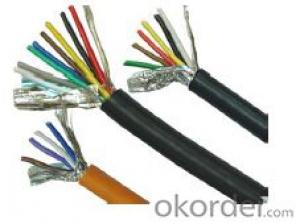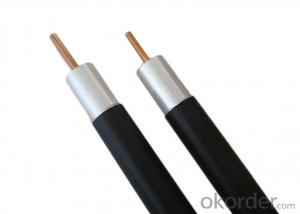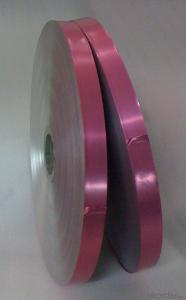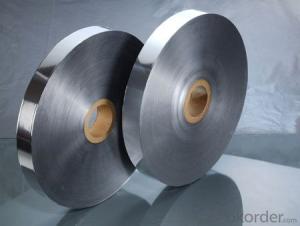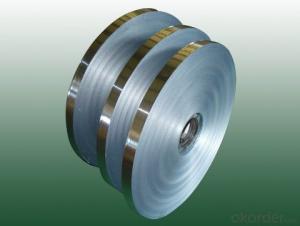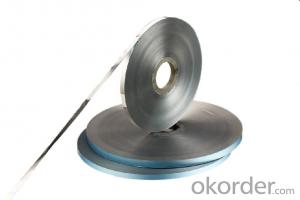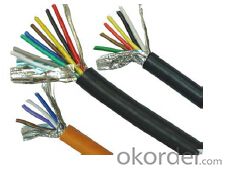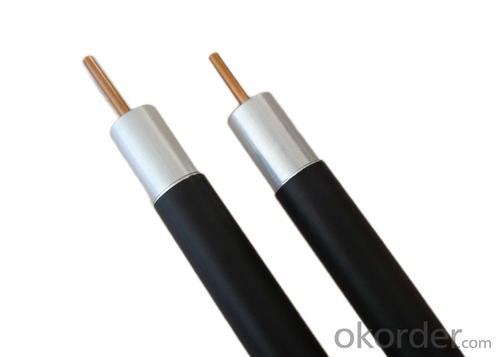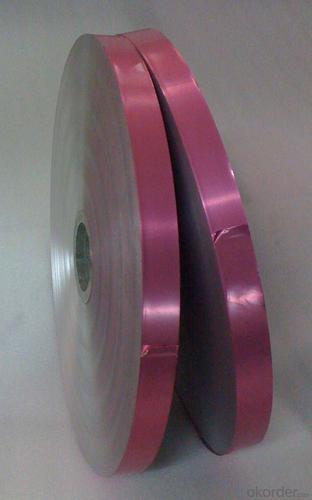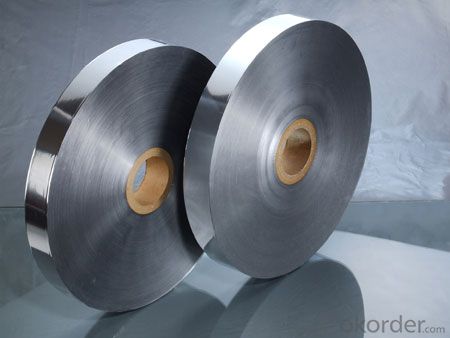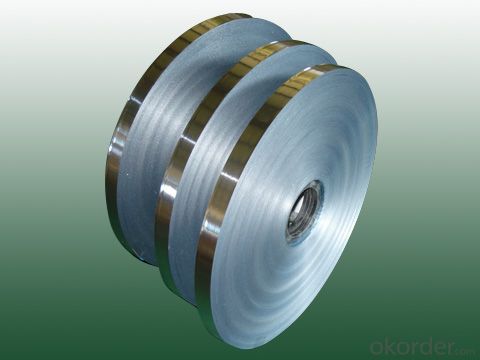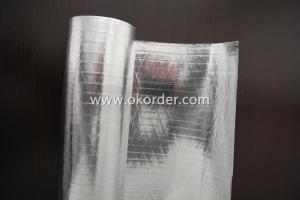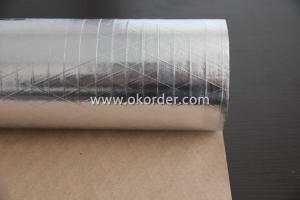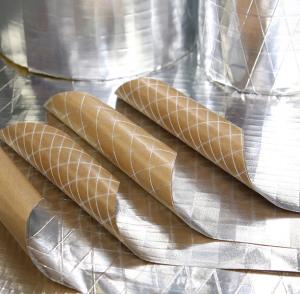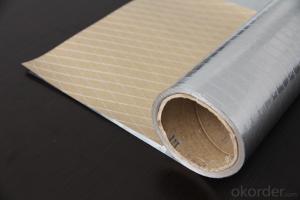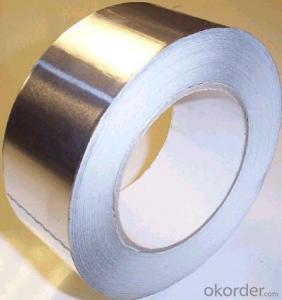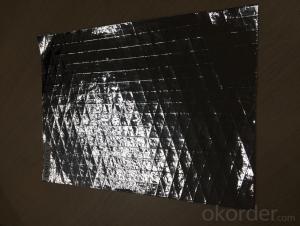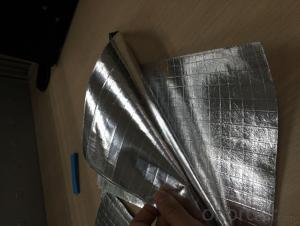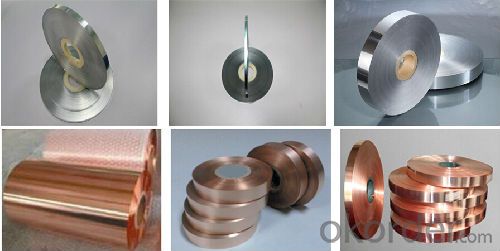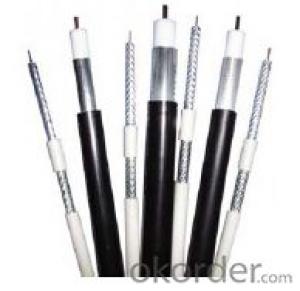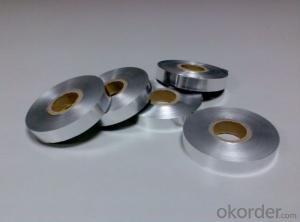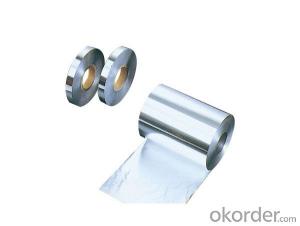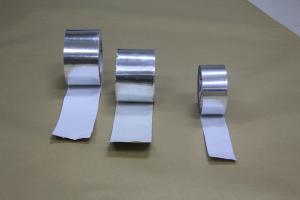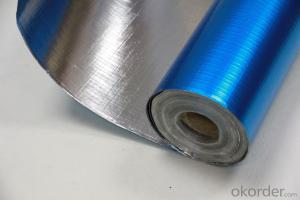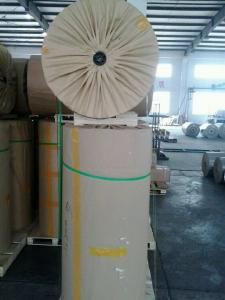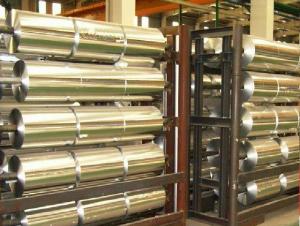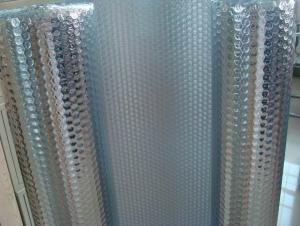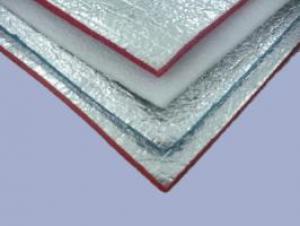Aluminum Foil Facing Copper Foil for Shielding Copper Cable
- Loading Port:
- Shanghai
- Payment Terms:
- TT or LC
- Min Order Qty:
- 1000 m²
- Supply Capability:
- 1000000 m²/month
OKorder Service Pledge
OKorder Financial Service
You Might Also Like
Aluminum Mylar foil Shielding Foil for Coaxial Cable communication cable
1.Structure of Aluminum Mylar foil Shielding Foil Description:
Electrical cable is used to transfer electricity, information and the realization of electromagnetic energy transformation. The electrical cable in a broad term mainly indicates to cable and in a narrow term indicate insulation material. Its definition is the aggregation of different parts below: one or more insulation cores, the wrapping layers of the cores, the general protective layers and the outer protective layers. Cables also include additive conductor without insulator.
2.Main Features of the Aluminum Mylar foil Shielding Foil:
Aluminum Mylar foil Shielding Foil is applicable to the shielding of coaxial cable, local network wire, electronic communication cable and computer peripheral wire etc.
1.Thickness: min 6.5mic; width: 300-1000mm.
2. According to GB/T 3198-2010.
3.Usages: cable shield, candy wrap
3. Aluminum Mylar foil Shielding Foil Images
4. Aluminum Mylar foil Shielding Foil Specification
AL-PET laminated foil
Description: Apply for overall or individual twisted pair shield for electronic cable and local network cables, protect from external electromagnetic interference. Features option of LUBRITAPE apply to decrease 50% friction of aluminum surface.
Construction: Aluminum foil, Polyester film
CODE | TOTAL THICKNESS | ALU THICKNESS | GLUE | POLYESTER FILM | WEIGHT |
FP007012 | 22±3 | 7 | 3 | 12 | 38.8±5% |
FP010012 | 25±3 | 10 | 3 | 12 | 46.9±5% |
FP020020 | 43±3 | 20 | 3 | 20 | 83.8±5% |
FP025012 | 40±3 | 25 | 3 | 12 | 87.6±5% |
Special specifications are also available, according to customer’s order. | |||||
AL-PET-AL laminated foil
Description: resilient shielding in cable assembling and provide the enhanced shielding required in harsh environments.
Construction: Aluminum foil +Polyester film+ Aluminum foil
CODE | TOTAL THICKNESS | ALU THICKNESS | GLUE | POLYESTER FILM | GLUE | ALU THICKNESS | WEIGHT |
DFP007015 | 35±3 | 7 | 3 | 15 | 3 | 7 | 65±5% |
DFP009020 | 39±4 | 9 | 3 | 15 | 3 | 9 | 76±5% |
DFP015025 | 61±5 | 15 | 3 | 25 | 3 | 15 | 115±5% |
DFP025025 | 80±5 | 25 | 3 | 25 | 3 | 25 | 175±5% |
Special specifications are also available, according to customer’s order. | |||||||
Bonded AL-PET laminated foil
Description: A laminated aluminum-polyester-aluminum tape is fully bonded to the foam dielectric to provide 100% coverage, longitudinally applied over the polyethylene core and the tape minimizes signal leakage.
Construction: Aluminum foil + Polyester film + Aluminum foil + EMAA film
CODE | TOTAL THICKNESS | ALU THICKNESS | GLUE | POLYESTER FILM | GLUE | ALU THICKNESS | GLUE | EMAA | WEIGHT |
DFPH009012 | 65±5 | 9 | 3 | 12 | 3 | 9 | 3 | 25 | 98±5% |
DFPH009020 | 72±5 | 9 | 3 | 20 | 3 | 9 | 3 | 25 | 108±5% |
DFPH009025 | 75±5 | 9 | 3 | 25 | 3 | 9 | 3 | 25 | 114±5% |
DFPH010025 | 84±5 | 10 | 3 | 25 | 3 | 10 | 3 | 25 | 126±5% |
Special specifications are also available, according to customer’s order. | |||||||||
Copper polyester foil
Description: Copper foil, copper lamination foil typically use as shielding for low/medium voltage cable and radio frequency coaxial cable. The rolled annealing copper foil is flexible to wrap cable core, also it has the excellent physical properties, Polyester film provides electrical insulation and high mechanical properties.
Construction: Copper foil + Polyester film
CODE | TOTAL THICKNESS | CU THICKNESS | GLUE | POLYESTER FILM | WEIGHT |
CP018012 | 33±3 | 18 | 3 | 12 | 175±10% |
CP007020 | 46±3 | 18 | 3 | 25 | 195±10% |
CP015012 | 30±3 | 15 | 3 | 12 | 160±10% |
Special specifications are also available, according to customer’s order. | |||||
5.FAQ
We have organized several common questions for our clients,may help you sincerely:
① Where you used this foil?
Aluminum Mylar foil Shielding Foil is used for cable shield, candy wrap for the shielding of coaxial cable, local network wire, electronic communication cable and computer peripheral wire etc.
②How to guarantee the quality of the products?
We have established the international advanced quality management system,every link from raw material to final product we have strict quality test;We resolutely put an end to unqualified products flowing into the market. At the same time, we will provide necessary follow-up service assurance.
③How long can we receive the product after purchase?
In the purchase of product within three working days, We will arrange the factory delivery as soon as possible. The pecific time of receiving is related to the state and position of customers.Commonly 7 to 10 working days can be served.
- Q: Is it possible to replace plastic wrap with aluminum foil for food storage or packaging purposes?
- <p>While aluminum foil facing can be used in some instances for food storage or packaging, it is not a direct substitute for plastic wrap. Aluminum foil is more durable and heat resistant, making it suitable for covering dishes or wrapping food for cooking or freezing. However, it is not as clingy or airtight as plastic wrap, which can be crucial for preserving freshness and preventing cross-contamination. Additionally, aluminum foil is not microwave-safe, unlike plastic wrap, which can limit its use in certain food storage applications. For best results, use the appropriate material based on the specific needs of food storage or packaging.</p>
- Q: Is it possible to use aluminum foil facing as a material for baking goods?
- <p>Yes, aluminum foil facing can be used to make baked goods, but it's important to use it correctly. Aluminum foil is a common material used in baking for lining baking sheets and pans to prevent sticking and to facilitate easy removal of baked goods. It's crucial to ensure that the foil is food-grade and safe for use with food. When using aluminum foil, make sure it covers the bottom and sides of the pan to prevent direct contact between the food and the pan, which can lead to uneven cooking or burning. Additionally, avoid using aluminum foil in broilers or at very high temperatures as it may melt or create a fire hazard.</p>
- Q: Is it possible to use aluminum foil with a reflective side to wrap sandwiches?
- <p>Yes, you can use aluminum foil facing to make sandwiches. The reflective side of aluminum foil is food-safe and can be used to wrap sandwiches for storage or transportation. It helps to keep the sandwich fresh and prevents it from drying out. However, it's important to ensure the foil is clean and free from any sharp edges that might tear the bread or packaging. Additionally, it's best to avoid using foil with non-stick coatings on the inside when in contact with food.</p>
- Q: What are the precautions to be aware of when using aluminum foil in the kitchen?
- <p>When using aluminum foil in the kitchen, it's important to avoid direct contact with acidic or alkaline foods as it may react and contaminate the food. Do not use it in broilers or ovens above 450掳F (232掳C), as it can melt and release harmful fumes. Avoid wrapping food in aluminum foil for extended periods, especially at high temperatures, as it may lead to the foil breaking down and leaching aluminum into the food. Always check for any tears or punctures in the foil to prevent food from coming into contact with the cooking surface directly.</p>
- Q: Is it possible for metal shavings to contaminate food when using aluminum foil with a shiny side?
- <p>There is minimal risk of metal shavings getting into food when using aluminum foil facing. Aluminum foil is designed to be safe for food contact and is generally resistant to shedding particles. However, if the foil is damaged or handled roughly, small particles could potentially come off. To mitigate this risk, ensure the foil is in good condition, avoid tearing it, and handle it carefully to prevent any metal contamination.</p>
- Q: What are the safety regulations or guidelines that aluminum foil facing must adhere to?
- <p>Safety standards for aluminum foil facing are crucial to ensure the product's safety and effectiveness. These standards typically include requirements for material composition, thickness, and bonding strength to ensure the foil's durability and resistance to tearing. Additionally, there are guidelines for the foil's reflectivity and heat resistance, which are important for its performance in various applications. Compliance with these standards is often verified through testing and certification processes, ensuring that aluminum foil facing products meet the necessary quality and safety benchmarks before they reach the market.</p>
- Q: The user is asking if it's possible to use aluminum foil with a reflective side facing out to cook a roast chicken.
- <p>Yes, you can use aluminum foil facing to make a roast chicken. The reflective side of the aluminum foil can help to retain heat and cook the chicken more evenly. However, it's important to note that the foil should not be in direct contact with the heat source for an extended period as it may cause the foil to melt or create a fire hazard. Make sure to monitor the cooking process and adjust the foil placement as needed to prevent any safety issues.</p>
- Q: Is it possible to replace plastic wrap with aluminum foil for food storage in containers?
- <p>Yes, aluminum foil can be used as a substitute for plastic wrap in food storage containers. It effectively seals in freshness and prevents air exposure, which is similar to the function of plastic wrap. However, aluminum foil is not airtight and may not be as effective in preventing the escape of odors or the entry of bacteria as plastic wrap. Additionally, it is not microwave-safe and can be less convenient for re-sealing. It's also important to ensure that the foil does not come into direct contact with acidic or alkaline foods, as this can lead to a reaction and potential contamination.</p>
- Q: This question asks for the method to wrap a hot pan using aluminum foil, with specific instructions on how the foil should face.
- <p>To wrap a hot pan with aluminum foil, first ensure the pan is stable and on a heat-resistant surface. Take a large piece of aluminum foil, about twice the size of the pan. Hold one corner of the foil and drape it over the pan, allowing the shiny side to face the pan. Gently press the foil against the pan, working your way around the edges to cover the entire surface. Ensure the foil is snug but not too tight to avoid tearing. The shiny side facing the pan will help reflect heat and protect the pan's surface. Be cautious while handling the hot pan and aluminum foil to avoid burns.</p>
- Q: Is it possible to use aluminum foil with a shiny side facing up as a liner for a baking pan?
- <p>Yes, you can use aluminum foil facing as a baking pan liner. The shiny side of the aluminum foil is non-stick and can be used to line baking pans, making it easier to remove baked goods without sticking. Ensure the foil is heavy-duty to withstand high temperatures and prevent tearing. However, avoid using it for direct contact with acidic or alkaline foods, as the foil may react with them. Always follow the manufacturer's guidelines for safe use.</p>
Send your message to us
Aluminum Foil Facing Copper Foil for Shielding Copper Cable
- Loading Port:
- Shanghai
- Payment Terms:
- TT or LC
- Min Order Qty:
- 1000 m²
- Supply Capability:
- 1000000 m²/month
OKorder Service Pledge
OKorder Financial Service
Similar products
Hot products
Hot Searches
Related keywords
